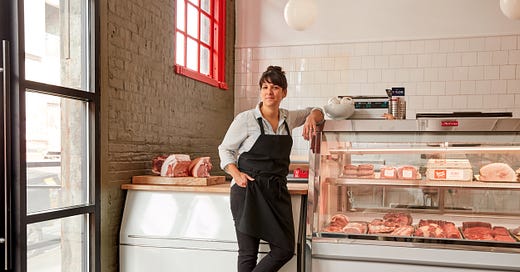Shutting It Down with Heather Thomason of Primal Supply Meats - Part 1
On making the (seemingly impossible) decision to pull the plug.
Hello! If you’d like to skip straight to listen to my interview with Heather Thomason of Primal Supply Meats, click here. Otherwise, read on. (And if you’re wondering what’s going on around here, this’ll help)
True to form for The Summer of Failure, I saw a couple of days ago that one of my favorite area restaurant’s last service was July 30. We hadn’t made it there since returning to Vermont at the top of the month, though Kha and I had certainly talked about it. The closure came as a social media surprise, and I can’t tell you anything about the why, except general speculation along the lines of everything I’ve been writing about this summer.
And…that’s usually how it goes, right? You’ve seen the the bittersweet and vague social media posts or received the emails. Sometimes, there’s some serious, neon flashing writing on the wall, like, how did they even make it that long? but just as often, things might look pretty good from the outside right up until the end!
This disjuncture between public and private is a big theme in the conversation I’m bringing you today, and it’s a constant tension for anyone that’s feeling bumpy, weird, or exhausted by their work and business.
“Find what you love and let it kill you.” —Charles Bukowski
Heather Thomason is the founder of Primal Supply Meats, a woman-owned whole animal butchery in Philadelphia that closed this past May after 7 years in business.
In their words, “Primal Supply Meats provided the highest-quality, local, sustainable meat to Philadelphians. We partnered with farmers who raise animals in pasture-raised environments and supply fresh, traceable meat to professional kitchens and home cooks.”
I wanted to get into the closure of Primal Supply both because it’s a great example of the collective failure I’ve written about— the increasing impossibility of running certain kinds of businesses in this economy— but also because I wanted to pull back the curtain on the whole emotional, complicated, rake-yourself-over-the-coals process of deciding to end it.
Heather’s a real one, as they say, and while I know she’s been processing privately, this is the first public conversation about the intensity of the past few years and her own process of coming to the tough decision to end what was, by so many measures, a successful business!
If it weren’t so wordy, I would have titled Part 1 of our conversation after the Bukowski quote.1
Like, every day I'm waking up and I don't feel like I'm working to succeed. I feel like I'm working to not fail and that doesn't give back to me.
Heather and I talk about the past few years of pandemic turmoil, the toll leading the business took on her, and how she got to the point of realizing she couldn't do it anymore. In part two, out soon, we talk through the very complicated and drawn out process of deciding to finally end it, and then how that all went down.
I also have an ulterior motive to confess.
I’m hoping that when you listen, you think a bit about the derangement of individual business ownership.
Part of my agenda with having this kind of conversation— which could certainly be framed as a kind of individual failure— is to hopefully itch at something more systemic: when enterprises like Heather’s rest on an individual’s shoulders it is a collective failure. While Heather does note that she always longed for a business partner, she and I have also talked offline about the impossibility of her business as an individually owned enterprise.
I am not against individually owned businesses by any means— some enterprises work beautifully that way!— but I will put a stake in the ground and say: scaled, labor based businesses owned by solo leaders make zero sense.
Yes, because I’d rather that workers own the means of production…but also because it’s waaaay too much responsibility to place on one person’s shoulders. Individual genius leaders are a myth, after all, and I’ve spent too much time with leaders buckling under the weight of heavy decisions over the past few years to not believe we need to keep pushing for more collective models of ownership and decision making.
Thanks for listening, and stay tuned for Part 2.
👉 This post is public so feel free to share it.
A Wanderwell Note:
Wanderwell will have a small handful of (rare) openings for new bookkeeping clients this fall. We’re a great fit for folks looking for strategically-minded, ace problem solvers to partner with in thoughtful finance. Click here to learn more.
This Bukowski quote came via
by Emily McDowell, whose recently published pieces on her viral-juiced stationary business nearly murdering her are certainly in conversation with Heather and my conversation. In fact, I found Emily’s pieces because Heather texted me links with the message these are very relevant!!, the morning we recorded.




